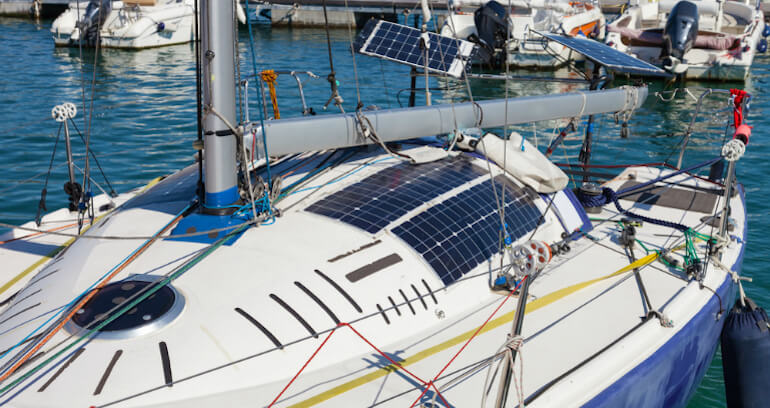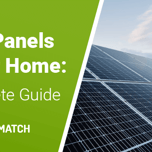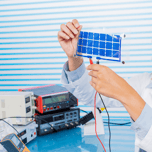Answer these simple questions and we will find you the BEST prices
Which type of solar quotes do you need?
It only takes 30 seconds
100% free with no obligation

Get up to 4 quotes by filling in only 1 quick form

Slash your energy bills by installing solar panels

For the average 2-3 bedroom house
- GreenMatch
- Solar Energy
- Solar Panels
- Solar Panels for Boats
Solar Panels for Boats: October 2025 Guide
Solar Panel Development in Transportation
Solar power dependency is rapidly increasing, as more people and industries rely on different solar technologies for power, such as solar panels. In the present, solar panels in the UK are able to supply a large amount of energy for a household’s necessities, allowing for self-sustainability after a short period of time after being installed. Moreover, solar power has been recently implemented into transportation, with the development of solar powered automobiles, and expanding to public transportation, air transportation and marine transportation.
Solar Panels for Boats
Solar power for boats has several advantages, among a few, are that it reduces carbon emissions, diesel costs and drastically reduces noise levels. The industry has grown offering several different solar options for boat owners, according to panel type and a charge controller system.
Types of Solar Panels for Boats
- Glass fronted: offer the most power at a lower cost, which makes them the most popular types of panels. Glass fronted panels can be of two types: polycrystalline and monocrystalline. Polycrystalline is the cheapest, but have lower energy conversion efficiencies, so are always larger and don't work so well in very hot weather. Monocrystalline is more expensive, but are very efficient and are therefore smaller and more effective in hot weather and on cloudy days.
- Polycarbonate: are the most expensive, and generally use polycrystalline technology. However, they are slightly flexible and can be fixed with a silicone adhesive and walked on. These are useful for boats such as yachts.
- Fully flexible solar panels: used to be restricted to 'amorphous' solar technology - the same as in your calculator.
Charge Controller System
This is required to connect the panels to the batteries and prevent overcharging. These are of several types:
- Basic charge controllers: use PWM (pulse width modulation, a technique used to encode information for transmission, allowing for control of the power supplied to electrical devices, especially to inertial loads such as motors. These types of controllers are simplistic, thus are the cheapest.
- Mid range controllers: use PWM but are fitted with LCD displays showing charge status and battery health and allow greater control of system parameters.
- MPPT controllers (maximum power point tracking): are the most expensive of the charge control options, but they have the added benefit of maximising power consumption to individual panel performance.

Installing Solar Panels on Boats
When taking into consideration installing solar panels on boats, there are several factors which need to be looked at. Lack of space is one of the main obstacles. Based on this, solar panels have been to have space and allow for the possibility to be walked on, maximising the use of space available. Some panels have been developed to allow for hanging from the mast, thus optimising all of the possible space. On larger boats with more space, glass-fronted solar panels can be installed, which offer the most power at the lowest cost, but cannot be walked on.
Installation Stages
Similar to all solar installations, the process of installing solar panels on boats can be divided into several stages:
- The first stage of the process would be an energy assessment of the boat, where it is decided how much power is used on the boat daily.
- Using this information results in how much energy the solar panels should produce and therefore concluding how large the panels need to be.
- Lastly, deciding on which types of panels will be installed, choosing between glass-fronted, polycarbonate or fully flexible panels.
The Benefits Of Solar Panels On Boats
Through the installation of solar panels, the cost of maintaining and running a boat could be drastically reduced. If a performant solar system is installed, the boat could become self-sustainable, eliminating the cost of fuel altogether. The load on the battery bank will be reduced, which is easier and less costly than generating more power. Carbon dioxide emissions will be reduced as well and there will be significant noise reduction.
Solar panel efficiency improvements are normally the first stage of any power system upgrades. Through careful choice of the devices to be powered, dramatic savings can be made in the average daily energy demand. Having a high-efficiency power strategy requires a far smaller battery bank, less bulky solar panels, smaller wind turbines, smaller cables, and far less total system weight.
Read more about our Top 100 Green Initiatives Awards, which depicts 100 green bloggers, schools, projects, websites, and community initiatives in the UK.
We strive to connect our customers with the right product and supplier. Would you like to be part of GreenMatch?





